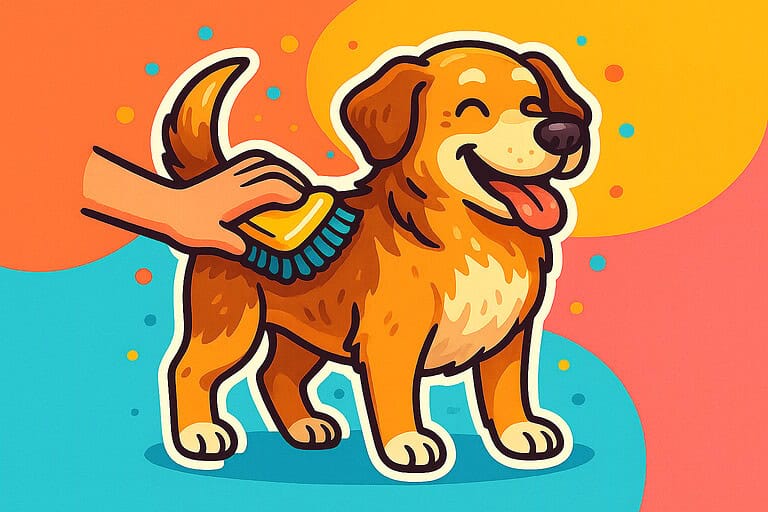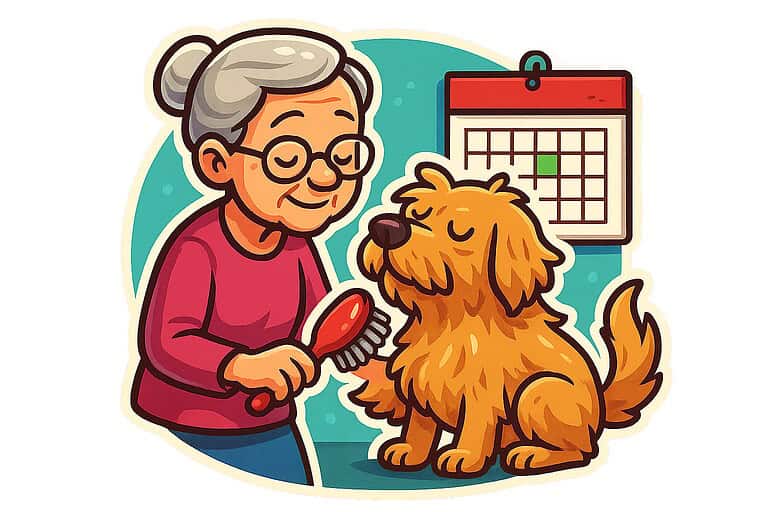10 Nutrients Your Senior Dog Needs Now

As your dog enters their golden years, you might spot subtle shifts in their energy, mobility, or appetite. Just like us, our four-legged pals need different nutrition as they get older to stay healthy and comfortable.
The right nutrients help your senior dog keep muscle mass, support joints, boost immunity, and stay sharp. Maybe you’ve wondered if your older pup needs special food or supplements, or perhaps they’re slowing down a little more each day.
With the right nutritional support, you can help your senior dog feel their best for years to come. From protein and omega-3s to joint-supporting compounds and digestive aids, some key nutrients really start to matter as dogs age.
1) High-Quality Protein Helps Maintain Muscle Mass and Energy
As your dog gets older, their muscles naturally start to weaken. Senior dogs lose muscle mass as they age, just like people do.
Protein becomes your furry friend’s best ally. High-quality protein helps them keep the muscle they still have and can even rebuild some of what they’ve lost.
Noticed your older dog moving slower lately? Protein gives them energy to stay active and playful.
Your senior dog actually needs more protein than they did when they were younger. Their body works harder now to maintain muscle, so they need extra support.
Look for dog foods with real meat as the first ingredient, chicken, beef, fish, and lamb are all excellent choices. These provide complete proteins.
If your dog still loves long walks, they’ll need even more protein than a couch-loving senior. Active older dogs burn more energy and need extra fuel.
Protein helps keep your dog strong, supports their immune system, and maintains healthy skin and coat. It’s like a daily vitality boost.
2) Glucosamine Supports Joint Health and Eases Stiffness
Have you seen your senior dog moving slower when getting up from their favorite nap spot? This stiffness is common as dogs age, but glucosamine can help.
Glucosamine is a natural compound in your dog’s cartilage. Think of it as the cushioning that keeps joints moving smoothly.
As your dog gets older, they produce less glucosamine. When you give your senior dog glucosamine supplements, you help restore that protective cushioning.
This can reduce the stiffness making morning walks tough for your furry friend. Glucosamine helps repair damaged cartilage and reduces inflammation in aging joints.
Most dogs handle glucosamine supplements just fine. You might see your dog drink more water or have a slightly upset stomach if you give too much at first.
The key is finding the right amount for your dog’s size and needs. Chat with your vet about the best glucosamine supplement and dosage for your senior companion.
3) Omega-3 Fatty Acids Like EPA and DHA for Coat and Cognitive Support
Noticed your senior dog’s coat looking a bit dull? Maybe their thinking seems slower than before?
Omega-3 fatty acids can help with both. EPA and DHA are the two most important types your older dog needs.
These fatty acids work like natural moisturizers for your dog’s skin. They help create that soft, shiny coat you remember from their younger days.
What’s really exciting, omega-3s also support brain health. They help keep your senior dog’s mind sharper and may slow cognitive decline.
Your dog’s body can’t make these nutrients on its own. You’ll need to provide them through food or supplements.
Fish oil is one of the best sources. Many owners find soft chew supplements easier to give than liquid oils.
If your dog licks their paws a lot or has dry, flaky skin, omega-3s might help. These fatty acids support your dog’s natural skin barrier.
Don’t expect overnight results. It usually takes about six weeks to see improvements in coat quality and skin health.
Senior dogs especially benefit from these nutrients since their bodies get less efficient at processing fats with age.
4) Antioxidants Like Vitamins C and E to Fight Aging and Boost Immunity
Your senior dog’s body works hard every day, and this creates something called free radicals. Think of these as tiny troublemakers that can damage your dog’s cells over time.
Antioxidants act like your dog’s personal bodyguards. They fight off these free radicals and protect healthy cells from damage.
Vitamins C and E are two of the most important antioxidants for your aging pup. Vitamin C boosts your dog’s immune system, which often gets weaker as they age.
Vitamin E protects your dog’s cell membranes and supports their overall health. Together, these antioxidants help slow down some signs of aging.
Maybe your older dog seems more tired or catches colds easier than before? Their immune system might need extra support.
Your dog’s body makes some antioxidants naturally, but not always enough. Adding more through food or supplements gives their immune system a needed boost.
These nutrients work together to help your senior dog feel more energetic and fight off illness better. It’s like giving their body extra tools to stay healthy.
5) Fiber Keeps Digestion Smooth and Regular
Your senior dog’s digestive system isn’t what it used to be. Like us, older dogs often deal with slower digestion and irregular bowel movements.
Fiber acts like a gentle helper for your dog’s gut. It feeds the good bacteria living there and helps everything move along smoothly.
Maybe your older dog has more bathroom troubles now? This is normal as dogs age. Their digestive systems slow down and need extra support.
Think of fiber as nature’s broom for your dog’s intestines. It helps prevent both constipation and loose stools by keeping things balanced.
You can find fiber in many dog-safe foods. Pumpkin, sweet potatoes, and green beans are great choices that most dogs enjoy.
If your dog gets constipated easily, adding some fiber to their meals can make a big difference. Start with small amounts and increase gradually.
Should you notice your senior dog straining or having irregular bowel movements, fiber might be just what they need. Always check with your vet first, especially if problems stick around.
High-quality senior dog foods often include the right amount of fiber already. Look for foods that mention digestive support on the label.
6) Vitamin B12 Supports Nervous System Function and Energy
Your senior dog’s brain needs extra support as they age. Vitamin B12 keeps their nervous system working properly and their mind sharp.
Think of B12 as your dog’s energy helper. It turns food into usable energy for daily activities.
Maybe your older dog seems less alert or moves more slowly? B12 deficiency could play a role.
This vitamin also makes red blood cells. These cells carry oxygen throughout your dog’s body, which is key for energy.
Most good dog foods contain enough B12 for healthy dogs. But senior dogs sometimes have trouble absorbing vitamins from their food as well as they used to.
If your dog takes medications or has digestive issues, they might be more likely to need extra B12. Your vet might suggest a blood test to check levels.
Some senior dogs benefit from B12 supplements or injections. You’ll want to work with your vet, they can recommend the right amount.
7) Calcium and Phosphorus for Strong Bones and Teeth
Your senior dog’s bones and teeth need extra support as they age. Calcium and phosphorus work together to keep your furry friend moving comfortably.
Calcium builds and maintains strong bones, teeth, and cartilage. It also keeps muscles working properly and prevents painful stiffness.
Phosphorus works hand-in-hand with calcium to create healthy bone structure. Without enough phosphorus, your dog’s body can’t use calcium effectively.
Have you noticed your older dog moving more slowly? This mineral duo also helps regulate acidity levels and supports energy production.
Most commercial dog foods contain balanced amounts of both minerals. If you’re feeding homemade meals, you might need to pay closer attention to these nutrients.
Early signs of deficiency include muscle tremors, weakness, and reluctance to move. Your dog might develop a stiff gait or seem uncomfortable during walks.
The right balance is key. Too much or too little of either mineral can cause problems, so work with your vet to make sure your senior dog gets what they need.
8) Probiotics Nurture a Healthy Gut and Improve Digestion
Your senior dog’s gut changes as they age, just like ours does. The good bacteria in their digestive system can get out of balance over time.
Probiotics are live, helpful bacteria that support your dog’s digestive health. Think of them as tiny helpers working inside your dog’s stomach and intestines.
As your dog gets older, they might struggle more with digestion or nutrient absorption. Maybe your senior pup has more stomach upset than when they were younger?
Probiotics can help restore the natural balance of gut bacteria. This makes it easier for your dog to digest food and absorb important nutrients.
These supplements come in different forms, powders, capsules, or chews. If your dog is picky about pills, the chewable treats might work better.
Look for probiotics made specifically for senior dogs. These often include extra ingredients for aging dogs‘ unique needs.
Regular probiotic use may help reduce digestive discomfort and support your dog’s immune system. A healthy gut often means a happier, more comfortable senior dog.
Talk to your vet about which probiotic might work best for your dog’s situation.
9) L-Carnitine for Heart Health and Fat Metabolism
Your senior dog’s heart works harder as they age, just like yours might. L-carnitine is an amino acid that your dog’s body makes naturally, but older dogs often don’t produce enough.
Think of L-carnitine as a tiny delivery truck. It carries fat to your dog’s cells, where it gets burned for energy instead of hanging around as extra weight.
This process is especially important for your senior dog’s heart muscle. The heart needs lots of energy to keep pumping strong, and L-carnitine helps make sure it gets the fuel it needs.
Maybe your older dog is gaining weight even though you haven’t changed their food? L-carnitine can help their body use stored fat more effectively.
Studies show that dogs getting L-carnitine supplements had better body composition and less fat mass. Your vet might recommend it if your senior dog struggles with weight or has heart concerns.
L-carnitine supports both problems at once, helping your dog maintain a healthy weight while keeping their heart strong.
10) Chondroitin Protects Cartilage and Improves Joint Comfort
Chondroitin acts as your senior dog’s joint bodyguard. This natural compound helps protect the cartilage in your dog’s joints from breaking down as they age.
Your dog’s cartilage acts like a cushion between their bones. Without enough protection, this cushion wears thin and causes pain.
Chondroitin works best when paired with glucosamine. Together, they help rebuild damaged cartilage and reduce stiffness in your dog’s joints.
Maybe your senior dog struggles to get up from their favorite nap spot? Chondroitin can help make those movements more comfortable.
This supplement also reduces inflammation around your dog’s joints. Less inflammation means less pain and better mobility for daily activities.
You’ll find chondroitin in many joint supplements made for senior dogs. It’s safe for long-term use and works gradually over time.
If your dog has arthritis or other joint problems, chondroitin can really improve their quality of life. They’ll be able to enjoy walks and playtime with less discomfort.
Talk to your vet about adding chondroitin to your senior dog’s routine. Every dog is different, so they can help you choose the right dosage.
Why Nutritional Needs Change as Dogs Age
Your senior dog’s body works differently than it did when they were younger. Their metabolism slows down, their digestive system becomes less efficient, and age-related health issues start to show up.
Metabolism and Energy Levels
Have you noticed your dog sleeping more and playing less? That’s totally normal as dogs get older.
Their metabolism slows down, so they burn fewer calories each day. Your dog needs about 20% fewer calories after age seven compared to their adult years.
If you keep feeding them the same amount, they’ll probably gain weight. Extra pounds put stress on aging joints and organs.
If your dog used to be a marathon runner, they’re now more of a casual walker. Their energy needs have changed to match their pace.
Senior dogs also lose muscle mass as they age, even if they keep a healthy weight. Less muscle means they burn even fewer calories at rest.
Key changes in senior dogs:
- Slower metabolism
- Reduced activity levels
- Muscle loss
- Lower calorie needs
Digestive System Changes
Your dog’s digestive system just doesn’t work as well as it used to. Maybe they seem pickier about food or have more stomach upset than before.
Production of digestive enzymes drops with age. This makes it harder for your dog to break down and absorb nutrients from their food.
They might eat the same amount but get less nutrition from it. Senior dogs often develop sensitive stomachs.
Foods that never bothered them before might now cause gas, loose stools, or nausea. Their sense of smell and taste can also decline.
Maybe your once-enthusiastic eater now turns their nose up at dinner. Warming their food a little can help make it more appealing.
Digestive changes include:
- Reduced enzyme production
- Slower nutrient absorption
- Increased food sensitivities
- Decreased appetite
Common Age-Related Health Concerns
Senior dogs deal with health challenges that shape what they should eat. Joint problems, kidney issues, and cognitive changes top the list.
Arthritis shows up in a lot of older dogs. Omega-3 fatty acids can help ease joint pain and stiffness. You might notice your dog moving slower or hesitating before jumping up.
Kidney function usually drops off with age. Older dogs need protein that’s high-quality but easy to process. Too much protein can stress their kidneys, but too little can shrink their muscles.
Cognitive dysfunction looks a lot like dementia in people. Some dogs act confused, anxious, or just forget their routines. Certain nutrients might help their brain and slow these changes.
Heart disease pops up more often in senior dogs. Diets with less sodium put less strain on the heart.
Common senior health issues:
- Arthritis and joint pain
- Kidney disease
- Cognitive dysfunction
- Heart problems
- Dental disease
Tips for Transitioning Your Senior Dog’s Diet
Changing your senior dog’s food takes patience and a bit of planning. You want to avoid stomach upset, so go slow and pay attention to how your dog reacts.
Introducing New Foods Gradually
Older dogs don’t handle diet changes as easily as they used to. Honestly, it’s a lot like how our own stomachs get more sensitive with age.
Plan for a 7-10 day transition period. Mix the new food with the old using this schedule:
- Days 1-2: 75% old food, 25% new food
- Days 3-4: 50% old food, 50% new food
- Days 5-6: 25% old food, 75% new food
- Days 7+: 100% new food
If your dog’s stomach is sensitive, stretch the transition to two weeks. No need to rush, going slower usually means fewer stomach issues.
Watch how your dog eats during the switch. Some seniors get pickier as they age. If they ignore the mix, try warming it up or adding a splash of low-sodium broth.
Watching for Food Sensitivities
Older dogs can develop food sensitivities out of nowhere. Maybe your dog ate chicken for years, and suddenly it doesn’t sit well.
Common signs to watch for include:
- Loose stools or diarrhea
- Vomiting
- Excessive gas
- Skin itching or scratching
- Loss of appetite
- Lethargy
Keep a basic food diary while you transition foods. Write down what you gave your dog and note any changes in behavior or bathroom habits.
If you spot concerning symptoms, slow down the transition or go back a step. Some dogs need three weeks to fully get used to new proteins or ingredients.
Senior dogs process food differently than younger ones. Their stomachs make less acid, and their intestines don’t absorb nutrients as well.
Should You Involve Your Veterinarian?
Your vet knows your dog’s health history better than anyone else. Before you switch foods, set up a check-up to talk about your senior dog’s unique needs.
Maybe your dog has early kidney disease, and you just haven’t noticed yet. Or maybe they need fewer calories now that their metabolism has slowed.
Your vet can spot these things before they turn into bigger headaches. Bring the new food’s ingredient list and nutrition info to your appointment.
They’ll let you know if the food fits your dog’s age, weight, and health conditions. It’s always better to ask than guess, right?
Ask your vet about:
- How much to feed each day
- Whether your dog needs any supplements
- Warning signs that mean you should stop the food switch
- How often you should check your dog’s weight
If your senior dog takes medication, check if the new food could mess with how those meds work. Some ingredients can change how your dog’s body handles certain medicines.






